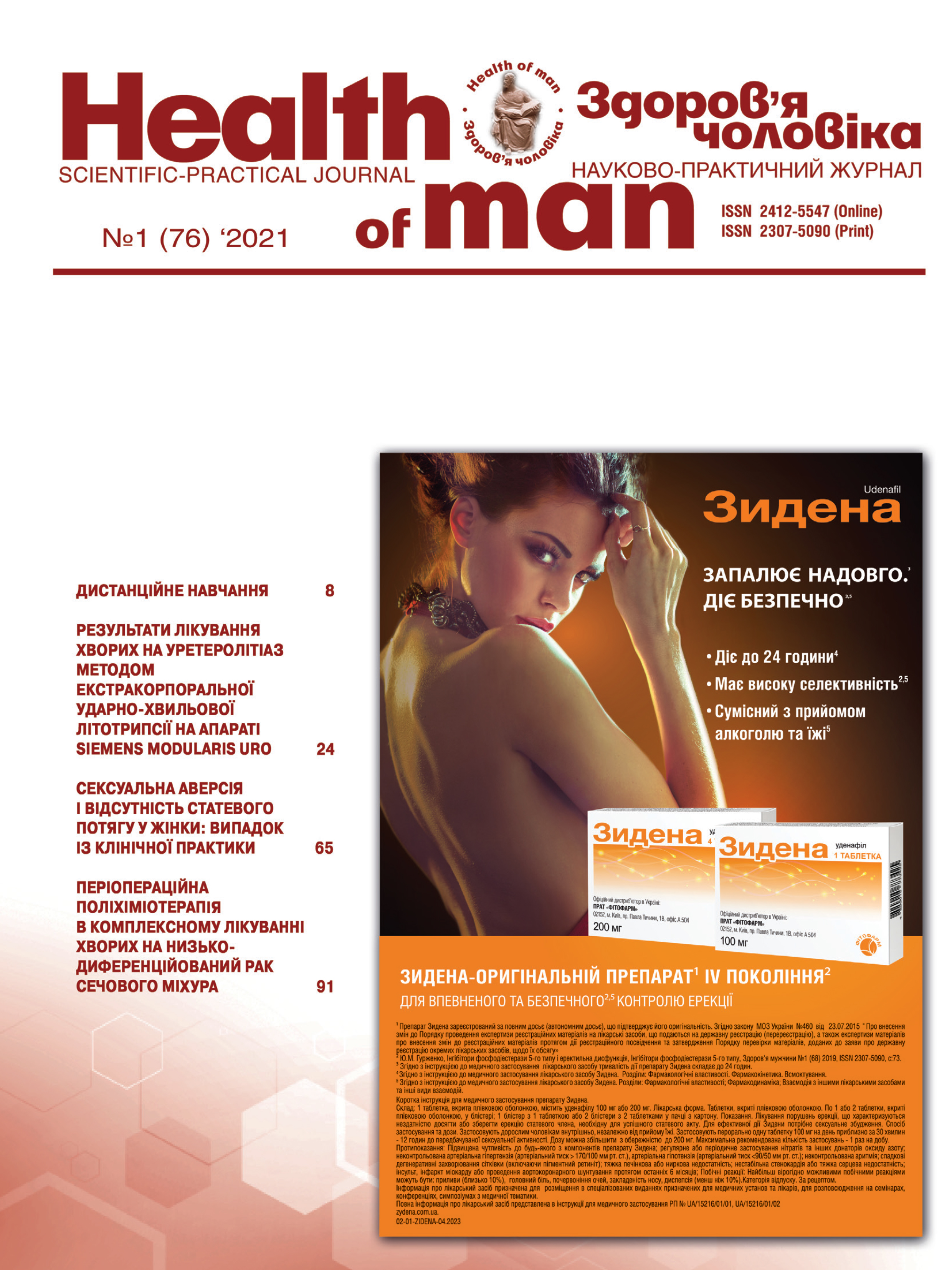Perioperative Chemotherapy in the Complex Treatment of Patients with High-grade Bladder Cancer
##plugins.themes.bootstrap3.article.main##
Abstract
Chemotherapy (CT) is a method of treating patients with muscle-invasive bladder cancer, most of which present as high-grade cancer, in neoadjuvant or adjuvant setting, to treat or prevent metastatic cancer.
The objective: to determine the place of perioperative PCT in the algorithm of complex treatment of patients with high-grade bladder cancer (HGBC) and its influence on survival rates.
Materials and methods. We performed retrospective analysis of medical histories of 522 patients with HGBC, who were treated in 1998-2016. Using the Kaplan-Mayer statistical method, we did a comparative analysis of the survival of HGBC patients who did and did not undergo perioperative CT as part of a comprehensive treatment.
Results. Perioperative CT was performed in 97 (18.6 %) patients, including neoadjuvant CT in only 4 (0.8 %) patients. Only among stage IV HGBC patients the adjuvant CT demonstrated significant differences towards better survival compared to patients without CT (p=0.004), with a 5-year survival rate of 18 % vs. 4 % in relevant groups. In the treatment of patients with stages I, II and III, no statistically significant differences in survival rates were found. The highest average survival rates of patients receiving PCT were found in patients treated with salvage cystectomy (68 months). Survival of patients after TUR, resection, RCE were similar (37-43 months) and do not differ statistically. The worst survival rates were in patients who did not receive surgical treatment and were treated with CT and radiotherapy only (9 months).
Conclusions. Postoperative chemotherapy significantly improved the survival of Stage IV HGBC patients after surgery, with 5-year survival of 18 % vs. 4 %. The best average survival rates (68 months) were demonstrated in the group of patients after salvage cystectomy.
##plugins.themes.bootstrap3.article.details##

This work is licensed under a Creative Commons Attribution 4.0 International License.
Authors retain the copyright and grant the journal the first publication of original scientific articles under the Creative Commons Attribution 4.0 International License, which allows others to distribute work with acknowledgment of authorship and first publication in this journal.
References
Федоренко З.П., Гулак Л.О., Михайлович Ю.Й., Горох Є.Л., Рижов А.Ю., Сумкіна О.В., et al., editors. Рак в Україні, 2017-2018. Захворюваність, смертність, показники діяльності онкологічної служби. Бюлетень Національного канцер-реєстру України. № 20 ed: Національний Інститут раку України;2018.
Yakovlev PG, Klyushin DA, Vereshchako RI. Bladder sparing surgery in high-grade bladder cancer. Exp Oncol. 2019;41(2):160–5.
Witjes J.A. (Chair), M. Bruins, R. Cathomas, E. Compérat, N.C. Cowan, G. Gakis, et al., editors. Muscle-invasive and Metastatic Bladder Cancer. EAU Guidelines. Edn. presented at the EAU Annual Congress Barcelona.: EAU Guidelines Office, Arnhem, The Netherlands.;2019.
Colombel M, Heidenreich A, Martínez-Piñeiro L, Babjuk M, Korneyev I, Surcel C, et al. Perioperative chemotherapy in muscle-invasive bladder cancer: overview and the unmet clinical need for alternative adjuvant therapy as studied in the MAGNOLIA trial. Eur Urol. 2014;65(3):509–11.
Alfred Witjes J, Lebret T, Compérat EM, Cowan NC, De Santis M, Bruins HM, et al. Updated 2016 EAU Guidelines on Muscle-invasive and Metastatic Bladder Cancer. Eur Urol. 2017;71(3):462–75.
Shariat SF, Karakiewicz PI, Palapattu GS, Lotan Y, Rogers CG, Amiel GE, et al. Outcomes of radical cystectomy for transitional cell carcinoma of the bladder: a contemporary series from the Bladder Cancer Research Consortium. J Urol.2006;176(6 Pt 1):2414–22; discussion 22.
Raghavan D. Chemotherapy for Invasive Bladder Cancer: Five Simple Rules Learned Over 30 Years. Bladder Cancer.2015;1(1):3–13.
Yin M, Joshi M, Meijer RP, Glantz M, Holder S, Harvey HA, et al. Neoadjuvant Chemotherapy for Muscle-Invasive Bladder Cancer: A Systematic Review and Two-Step Meta-Analysis. Oncologist. 2016;21(6):708–15.
Gupta A, Long JB, Chen J, Gross CP, Feldman DR, Steingart RM. Risk of Vascular Toxicity with Platinum Based Chemotherapy in Elderly Patients with Bladder Cancer. J Urol. 2016;195(1):33–40.
Li G, Niu HM, Wu HT, Lei BY, Wang XH, Guo XB, et al. Effect of cisplatin-based neoadjuvant chemotherapy on survival in patients with bladder cancer: a meta-analysis. Clin Invest Med. 2017;40(2):E81–E94.
Mulders PFA, Martínez-Piñeiro L, Heidenreich A, Babjuk M, Colombel M, Colombo R, et al. Adjuvant recMAGE-A3 Immunotherapy After Cystectomy for Muscle-invasive Bladder Cancer: Lessons Learned from the Phase 2 MAGNOLIA Clinical Trial. Eur Urol Focus. 2018.
Kim HS, Jeong CW, Kwak C, Kim HH, Ku JH. Adjuvant chemotherapy for muscle-invasive bladder cancer: a systematic review and network meta-analysis of randomized clinical trials. Oncotarget. 2017;8(46):81204–14.
Liu D, Abbosh P, Keliher D, Reardon B, Miao D, Mouw K, et al. Mutational patterns in chemotherapy resistant muscle-invasive bladder cancer. Nat Commun. 2017;8(1):2193.





